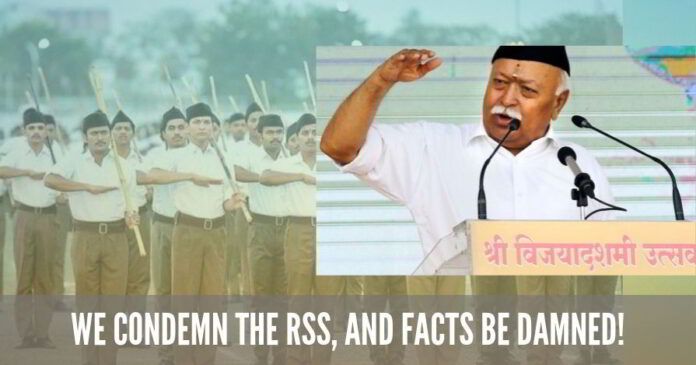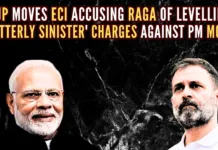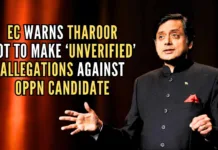
It is unlikely that such critics will reform. After all, one can wake up a sleeper, but how does one awaken a person who pretends to sleep?
There cannot be any objection to constructive criticism of the Rashtriya Swayamsevak Sangh (RSS). But several critics in their over-zeal to condemn the organisation resort to either distortions or cherry-picking or obliteration of facts. A case in point is the furore created by RSS chief Mohan Bhagwat’s Vijayadashami Day address, in which he made the following points: One, that those who indulge in violence in the name of religious beliefs (cow vigilantes, for example) must be punished as per law. Two, the term ‘lynching’ is alien to India’s culture of tolerance, and it seeks to malign the entire Hindu community. And three, India is a Hindu Rashtra in terms of cultural understanding.
There was neither anything new in what Bhagwat said —these have been the RSS’s stated positions — nor anything objectionable. And yet the RSS-baiters pounced upon his remarks to prove that the RSS ‘practised a communal agenda’. For decades, they have been hammering away at the organisation with half-baked material in the hope that they could contain its growth and influence, but have instead ended up doing the opposite: The RSS has only got stronger and more mainstreamed. These critics are no better informed than Pakistani Prime Minister Imran Khan, who said that MS Golwalkar had established the RSS and Vinayak Damodar Savarkar was associated with it.
The RSS’s student wing, the Akhil Bharatiya Vidyarthi Parishad (ABVP), in particular, has campaigned in an aggressive and sustained manner to promote awareness against caste-based discrimination
Let’s do a reality check on two points of criticism. The first is that Hedgewar and the RSS had not taken part in the country’s struggle for independence. His critics fail to acknowledge that he had once been a Congressman and had worked closely with several leading Congressmen in the struggle for freedom. He was even briefly jailed for being part of Mahatma Gandhi’s Satyagraha movements. He had been charged with sedition, and his release was marked by a rousing reception he received, which was attended by the likes of Motilal Nehru, C Rajagopalachari and Hakim Ajmal Khan. Meanwhile, a group of activists within the Congress floated the Hindustani Seva Dal, which was more belligerent in its approach to the cause of freedom, and Hedgewar presided over the trust that managed this organisation. The Hindustani Seva Dal would later go on to become the Congress Seva Dal.
Hedgewar’s subsequent disenchantment with the Congress was both on ideological and practical grounds. He believed that Congress had begun to give away too much ground to the Muslim radical elements without anything in return. The more the Congress talked about Hindu-Muslim unity the more the extremists pushed for a separate identity for Muslims and Muslim homeland. This friction suited the British and their policy of ‘divide and rule’.
This then was the ground situation. Ideologically, Hedgewar firmly believed that people could effectively take on their colonial masters only if they were as strong as the ruler. He said at a gathering to protest against Mahatma Gandhi’s arrest, “For establishing swarajya, it is necessary to acquire the physical strength of the opponent and then speak the language of peace.” By this, he meant the strength of unity, and that unity could come if the people were bound by an understanding of their common cultural roots. He also called upon sacrifice to attain the goal: “If you have to follow Mahatma ji, anoint yourself with Tulsi, forsake everything and join the nationalist struggle.” Hedgewar was disillusioned by the Congress’s methods and came to the conclusion that a political party, given its constraints, could not revamp the mindset of millions of Indians — something that was acutely needed to gain and sustain freedom. He was on the same page as Gandhi when he said that the foundation of the nation’s liberation could not be located in any one personality; the entire Indian mass had to identify with the cause and fight for it. It was the Congress which promoted the personality cult, elevating Gandhi, and even Jawaharlal Nehru, to superhuman status. Incidentally, BR Ambedkar too had taken strong exception to this phenomenon.
The other point of criticism has been that the RSS has promoted the caste Hindu dominance — many of its chiefs came from the so-called high caste community. Combating the discriminatory caste system has been one of the long-running projects in our country’s socio-political engagement. From Gandhi to Ambedkar to Kanshi Ram to Mayawati, everybody has in their individual ways sought to address the issue. But few people, especially the centrist and Left-leaning liberals and intellectuals, have given the RSS due credit for its work in this area. Early on, the RSS realised that its goal of social unity in a Hindu Rashtra could never be realised so long as the Hindu community was divided along caste lines. The Sangh has, therefore, continuously promoted an end to caste-based social discriminations. The second RSS chief, MS Golwalkar, once remarked that “the country was divided because of the disorganised state of Hindus”. He was referring to the various caste factions creating friction with the Hindu faith. He also announced that “no Hindu can be impure”. The third RSS chief Balasaheb Deoras said in one of his addresses in Pune, “There is no greater sin than untouchability. It should go lock, stock and barrel.”
To carry forward its commitment to fight caste discrimination, the RSS and its affiliates have taken several measures. At the Sangh’s foundation laying ceremony in November 1989 for a Ram temple in Ayodhya, the foundation was laid by a Scheduled Caste member from Bihar. The RSS’s student wing, the Akhil Bharatiya Vidyarthi Parishad (ABVP), in particular, has campaigned in an aggressive and sustained manner to promote awareness against caste-based discrimination. Over the decades, several authors and academics associated with the RSS or influenced by its thoughts, have written on how the organisation had been in the forefront of the movement to abolish the pernicious caste system.
Ambedkar has been coopted by the organisation as one of the leading lights of the movement. In fact, this giant intellectual and politician had once visited the Sangh camps and praised the RSS’s drive for social unity, though he did admit that while the Sangh’s task was a long and arduous one, he himself had no time, in view of his health; besides, he added, his fellow caste men too had run out of patience.
As part of its commitment, the RSS and its affiliates have been organising various programmes to end caste discrimination. The Sangh has held tribal conferences and even extended support to bodies that are not part of the Sangh umbrella but working in a similar direction. The Kala Ashram is one such example. The incumbent RSS chief has given an interesting call to deal blows to caste-based discrimination: ‘One village, one temple, one common source of water, one common crematorium.’
But everything that has been said above is missing from the narrative that critics of the RSS have popularised against the Sangh. It is unlikely that such critics will reform. After all, one can wake up a sleeper, but how does one awaken a person who pretends to sleep?
Note:
1. The views expressed here are those of the author and do not necessarily represent or reflect the views of PGurus.











RSS is a great socio cultural organisation but it cannot proclaim that it is the sole proprietor of Hinduism. If this contention is accepted, there is no difference between Hinduism and other dogmatic religions. In fact Hinduism is the broad based collective of various faiths and traditions. RSS shouldn’t attempt to impose an omnibus religion on Hindus based its own weird notions. As far as the role of RSS is concerned it may strive to protect Hinduism by
1. Asking BJP government to end all discrimination against Hindus and Hinduism
2. Free temples from government control
3. Build Ram temple expeditiously
4. Free Kasi and Mathura Temples
5. Promote Sanskrit as national language
6. Not to impose Hindi to alienate other language speaking Hindus
7. Follow free market economy instead of Hindu Socialism
8. Don’t make Hinduism a dogmatic religion
9. Ask BJP to remove Socialist and Secular from Constitution
Castes are an integral part and parcel of Hindu Dharma. To which Dharma does RSS subscribe if it claims it does not believe in Jatis? Are they really Hindus by Dharma and ascribe to, believe in and follow Hindu Dharma? How? If they do; how can it be without Varnas and Jatis? Do they also believe in and subscribe to any Hindu religious text? Which is that? We do not think so, for there is no Hindu Dharma and any Hindu religious text which does not talk of the four Varnas and a number of Jatis. How can they – and do they – explain their claimed Hindu-hood? Where is it in the Vedas and Dharma Shastras? Without that how do they – and how can they – claim they are Hindus? Doesn’t a Hindu have to believe in and follow Shrutis and Smritis?